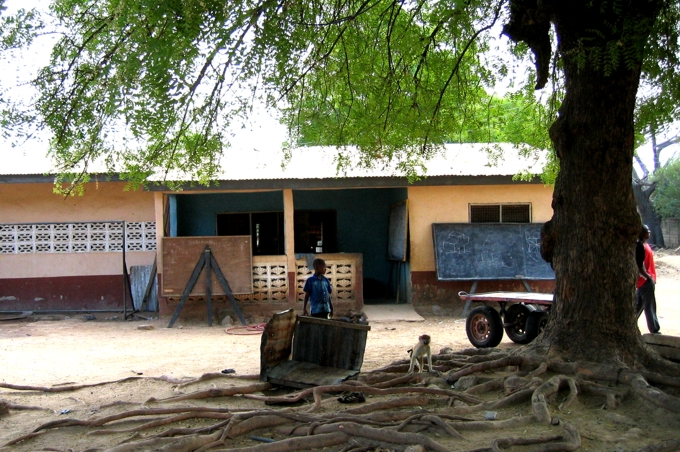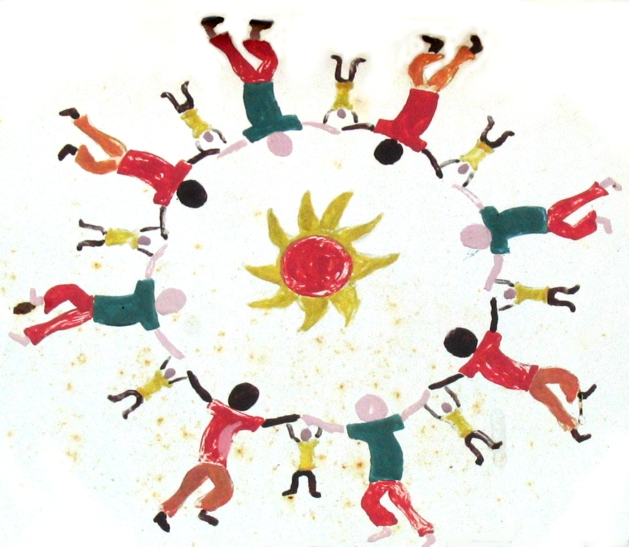 Horizons Children's Centre, Sandema
Horizons Children's Centre, Sandema
 Horizons Children's Centre, Sandema
Horizons Children's Centre, Sandema
Heather Menezes tells the Story
Interviewer: Ghanatta Ayaric (editor of BULUK)
Buluk: Mrs Menezes, thank you for consenting to talk about your foster home in the Bulsa district with BULUK. The journal is honoured. All we know about you so far is that you are Canadian and you run a children’s home in Sandema. Could you tell us more about yourself?
Mrs Menezes: My parents immigrated to Canada from India in the 1960s, and this has always been an important part of my cultural identity. I grew up in Toronto with my brother and two sisters. As new immigrants, my parents had to work so hard to support all of us, and they did an outstanding job!
In
university, I studied Political Science and French, and also pursued a Bachelor
of Education. With a lot of hard work, I received
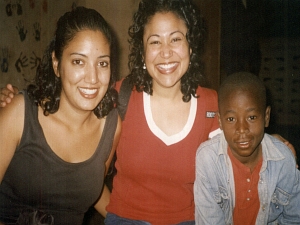 scholarships
which enabled me to complete a Master of Science (Development Studies) degree at
the London School of Economics and Political Science in England, where I
received a Distinction as well as a dissertation prize.
scholarships
which enabled me to complete a Master of Science (Development Studies) degree at
the London School of Economics and Political Science in England, where I
received a Distinction as well as a dissertation prize.
For the past several years, I have been teaching in Toronto, where I live with my husband Ian. My family lives in Toronto as well, and we all spend time working together on the Horizons project.
Buluk:When did you first go to Bulsaland, and what took you there?
Mrs Menezes: Shortly after I returned to Canada from England, I started to apply for volunteer positions with NGOs in various developing countries. I had studied 'development' throughout university and was keen to apply this knowledge in a real context. A dear friend was working on a project in northern Ghana (Sandema) and told me that they needed another volunteer. I applied and the rest is history!
Buluk: What were some of your first impressions and experiences?
Mrs Menezes: The first time I arrived in Sandema, I remember marvelling at the beautiful canopy of trees that line the main road. The bright green leaves contrasted with the red earth...every time I return to Sandema I just love seeing those trees!
Of course, I was equally amazed by the warmth and friendliness of everyone I met. People went out of their way to welcome me, and to make me feel at home. A smile from a stranger, a warm greeting on my way to town, a friendly chat by the side of the road...these were all such special first experiences for me.
I was working on an education project, in partnership with GES [Ghana Education Service]. Working with Circuit Supervisors, we travelled to communities (Wiaga, Kanjarga, Wiesi, Chuchuliga) and I saw firsthand the harsh reality of rural poverty. It was painful to see how people were struggling to survive in the villages. Yet, they would make time to come to PTA [Parent-Teacher Association] meetings to discuss their children's education. I was so impressed by their dedication as parents and their deep desire for a better future for their children.
Buluk: When did you start Horizons Children’s Centre?
Mrs Menezes: I arrived in Sandema in September 1999. In January 2000, I was at home one day when a tiny boy named Kasimu arrived at my door. He looked to be 8 years old, and his clothes were in tatters. In a barely audible voice, he asked for me for 500 cedis and showed me a badly infected sore on his leg. I decided to take him to the pharmacy in town to buy some medicine for him. Little did I realize that the short journey into town would change my life.
Kasimu was a street child. As I got to know him better, I came face to face with the reality of many other youngsters desperately trying to survive on the streets of Sandema. Most of these children were orphans or living in abject poverty. They faced overwhelming obstacles in life-hunger, loneliness, sickness, and social rejection. I felt compelled to help improve their lives.
I began to meet a small group of street children every morning on the verandah of a local store in town. I would bring them a morning meal and we would share some conversation before they started their long day of work. Through my interactions, I realized that all these children shared the same dream: they wanted to go to school. Because I was working on an education project, it was easy to speak to my colleagues at GES and get the boys enrolled. With the help of Simon Akoba (who was working at the pharmacy on the first day I arrived with Kasimu), we also found accommodation for the children.
Buluk: Was it an idea you had had before actually concretizing it in Sandema or rather a spontaneous idea that originated from your visit(s) / interaction with people in the district?
Mrs Menezes: As you can see from my description above, I had no intentions of establishing any formal program. My only intention was to help the few children whom I had met. I wrote to my family and they all offered to help pay for the children's school fees and living costs, and that is really how Horizons started. To this day, I can hardly believe how we have grown and developed, and that we have been active for 11 years.
Buluk: How did you start, concretely (choosing the site, housing the project, finding local collaborators, dealing with bureaucratic formalities...)?
Mrs Menezes: Two people were instrumental in the initial establishment of HCC in Sandema. Mr. Simon Akoba was my 'translator' in all my interactions with the children. He understood that I wanted to support the kids, and helped me to find the accommodation, arrange schooling etc. We decided to rent two rooms in a house located behind the market in Sandema town, so that the children could live together. I purchased all the basic household necessities (sleeping mats, cooking pots, etc.) for the children, and initially, the boys were responsible for cooking their own meals. After several months, we hired someone to prepare their meals.
The second person who provided invaluable support was Mr. Maxwell Akendem. At the time, Maxwell was working as a Social Worker for an NGO (Presby CBR). He provided me with advice and guidance regarding the local culture and carried out 'social investigations' for each child. This involved visits to each child's village, meetings with extended family members to discuss our program and an assessment of the home condition. With Maxwell's assistance, we also went through the long and tedious process of registering as an NGO with the Department of Social Welfare and the Registrar-General in Accra. I remember making so many trips to their offices in Accra before we finally received our certificate!
Maxwell, Simon and I worked in partnership to establish Horizons, and we all spent countless
hours in the first few months trying to put everything into place. Simon became our first
Programme Coordinator (he is no longer working with HCC), and Maxwell continues to be
actively involved with Horizons and the kids. He is now the Manager of the Presby CBR
program in Sandema.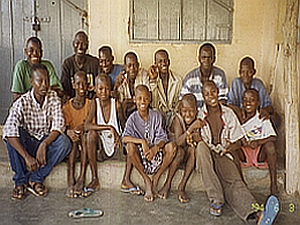
Buluk: How many children did you start with and how many do you have at the moment?
Mrs Menezes: We started with 9 children (the original group). Today, we have 25 boys living at our centre, and we are currently supporting 12 girls with scholarships. All the girls are attending senior secondary school.
Buluk: Do you have a criterium (age, sex, ...) for your selection ?
Mrs Menezes: Because our home is relatively small, we can only accommodate boys at the centre. So this is one criterium. Through the years, we have realized that it is best to admit children when they are very young, so they get the maximum value, educationally, from our program. Most of our recent additions are aged 4-6. Of course, we only take in children who are from poor families. Our social investigation allows us to determine whether the family is able/unable to provide for the child's needs, and when we have ascertained this, we then admit the child to our centre.
Mrs Menezes: Three years ago, we set up a scholarship program for needy girls. Each year, we take applications from girls who are academically strong, but who cannot afford to attend SSS. Through the application process and a review of the girls' transcripts, we choose to sponsor a few girls each year.
Buluk:Do you have children from other Bulsa villages?
Mrs Menezes: We accept children from all of the villages in the district. Just this year, two brothers from Kanjarga joined our program.
Buluk: What’s the day in your home like?
Mrs Menezes: The children wake up very early (4:00 a.m. - 5:00 a.m.). They do some light morning chores (sweeping the compound etc.), bathe, have breakfast and walk to school. They return from school at around 2:00 p.m., take their lunch and have a short rest. From 3:00 p.m.-5:00 p.m., the children have after-school classes. We have part-time teachers who come to the centre to give lessons to the children, who are divided by age group. At 5:00 p.m., the boys bathe and then have supper. They then do their homework together in the hall. On some evenings, we have a 'family meeting', or an evening program of singing, drama etc. Volunteers often arrange these fun activities for the kids. At 9:00 p.m., they all go to bed. Weekends are a little more relaxed, as the kids have to wash their clothes and clean the house, but also have plenty of time to play football, volleyball etc., and cooperative games.
Buluk:Who are your local collaborators, and what qualifications and experience do they bring into the project?
Mrs Menezes: We are fortunate to have established many wonderful partnerships in the District. First and foremost, we work closely with the local Social Welfare officers. For our Girls Scholarship program, we consult with the GES Girls' Education Officer. He coordinates all of our part-time teachers, who are also local teachers from schools in the district. We also collaborate with the Presby CBR program, and the Sandema Association for People with Disabilities. Our Board members include Mr. Gaby Commey, who is a Headmaster of a school in Sandema, Mr. Donatus Abag-dem, who is the Director of CHRAJ Regional Office in Bolgatanga, and Ms. Jane Apenkuum, who is from Sandema and is currently living and working in Tamale.
Buluk: I guess it wasn’t easy-going when you were starting. What were some of the initial problems you encountered?
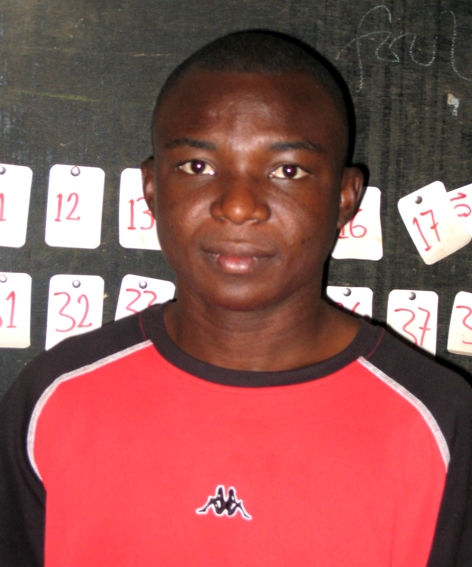 |
|
Joseph Abobtey |
Mrs Menezes: Working with street children of different backgrounds and ages has brought many challenges. We have had to establish very strict rules at the centre to encourage exemplary behaviour, and as much as it has pained us to do so, we have had to dismiss children over the years for not complying with our rules. We always have to bear in mind that our younger children look to the older boys as role models, and so if we allow the older boys to misbehave, this sends a powerful message to the younger ones. There is nothing more disheartening than having to dismiss a child who demonstrates potential, but yet is unwilling to accept the rules of our centre.
In the early years, we worked hard to find the right staff members. I am very happy to say that we now have an outstanding staff. Our Programme Coordinator, Mr. Joseph Abobtey, is remarkably capable and dedicated. Our House Mother, Madam Judith Adom, works tirelessly day in and day out to prepare hearty meals for our children. Our entire staff work as a team to help the children be the best they can be.
Buluk: Does your organization / project have rules / statutes, if yes, could you dilate on these?
Mrs Menezes: We do have a Constitution which is a guiding document for our operations. The Constitution outlines our mission, financial practices, etc.
Buluk: How do you fund Horizons Children’s Centre?
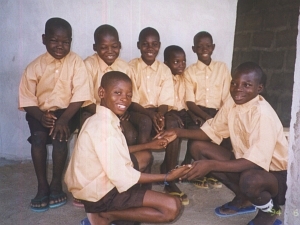
Mrs Menezes: Over the past eleven years, HCC has been funded entirely through private donations. Family and friends have donated faithfully each and every year to support our program activities. Because we all volunteer our time in Canada, we are proud that all the money we receive goes directly towards our project work in Ghana.
We have also been blessed with many outstanding volunteers, who have spent months working at our centre. Often, these volunteers organize fundraisers either before they leave or when they return, and this has certainly enabled us to pursue specific projects, such as the ongoing construction of our permanent new home.
Buluk: How is the cooperation with the district administration and other bodies / projects in the district?
Mrs Menezes: As described above, we work closely with our District partners and value their input and ideas. The District Assembly has graciously provided us with a place to house our volunteers and GES is always very helpful when we require assistance.
Buluk:Where the cooperation isn’t good, are there conflicts? If yes, what kind?
Mrs Menezes: One of the important lessons we have learned over the years is the absolute necessity of maintaining good relations with partner organizations in the district. We can achieve so much more when working in harmony with others, instead of engaging in conflict. I am very proud of the positive relationships I have developed with people in the district over the years.
Buluk: How did you overcome the challenges of climate, disease (malaria), language problems, unusual food, political events etc.?
Mrs Menezes: In all my years of travelling to Ghana, I consider it a small miracle that I have never had malaria! My sister Jeanette did get malaria when we were in Sandema in 2004, but with the kind help of the Sisters at the Wiaga Clinic, she recovered quickly.
As far as the climate, language, food and politics go, my family and I have always approached these experiences with an open mind and heart. The Buli language is so lovely to speak, and although we only know our greetings and some simple phrases, we enjoy speaking to people everywhere we go in Sandema.
Buluk:Tell us about some events in the Builsa district which gave you most satisfaction, pleasure, motivation...
Mrs Menezes: I met the Paramount Chief of Sandema on many occasions before he sadly passed away. He was a man of unparalleled integrity, wisdom and kindness, and I will never forget the times that I visited his palace. He would always listen so intently and speak so eloquently, and he was an extraordinary source of moral support and encouragement for me, especially in the early years of our program. I consider myself truly blessed to have been in his presence.
Buluk: How often are you in Sandema, and how do you coordinate work from far away Toronto?
Mrs Menezes: As I have mentioned, my entire family is involved with Horizons. We all take turns making annual trips to Sandema to monitor the program. My sister Andrea and I are both teachers, so we are fortunate to have 2 months of summer vacation. This is an ideal time to go to Ghana. My brother Derek and my sister Jeanette have taken time away from their jobs to travel to Sandema and work on our project. And I can't forget to mention my father, who travelled to Sandema for the first time two years ago, at the ripe age of 80 years old! My mother, husband Ian and sister-in-law Rita help out here in Canada with clothing drives, and Ian also does our website, and newsletters.
Buluk: What are your plans for the future?
Mrs Menezes: Right now, we are in the process of constructing a permanent home for the children. We purchased a plot of land and are slowly adding to the structure as funds become available. Our target date for completion of the main structure is July 2011, and we are searching for funding organizations to support this project.
Of course, we will continue to develop our core programs: the children's centre and our scholarship program. We also have a computer centre in town, and we would like to use this computer centre as an educational facility for JSS [Junior Secondary School] students and SSS [Senior Secondary School) students, to give them IT training. So we will be looking for funding for this project as time goes on.
Buluk: Mrs Menezes, we thank you for this interview.
Website: http://www.horizonscentre.org
